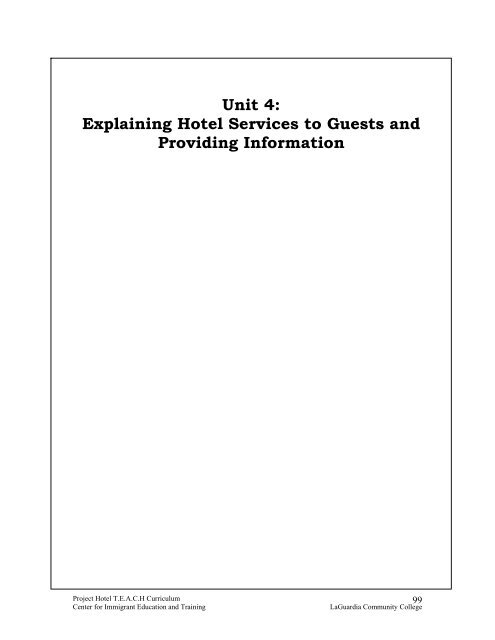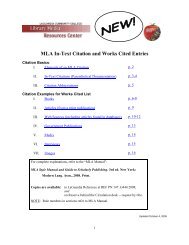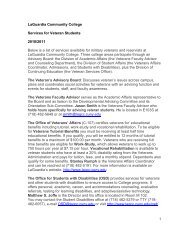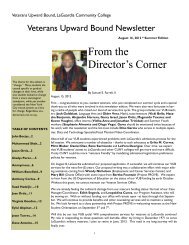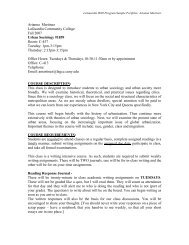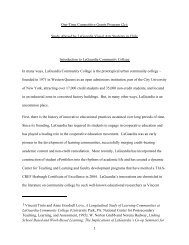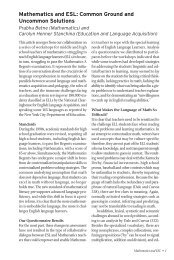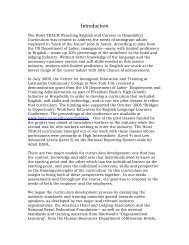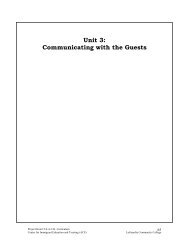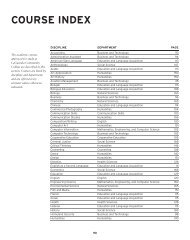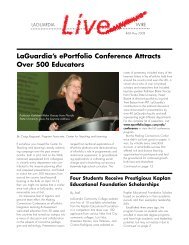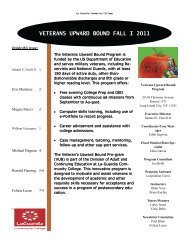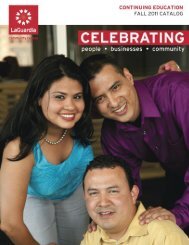Unit 4: Explaining Hotel Services to Guests and Providing Information
Unit 4: Explaining Hotel Services to Guests and Providing Information
Unit 4: Explaining Hotel Services to Guests and Providing Information
Create successful ePaper yourself
Turn your PDF publications into a flip-book with our unique Google optimized e-Paper software.
<strong>Unit</strong> 4:<br />
<strong>Explaining</strong> <strong>Hotel</strong> <strong>Services</strong> <strong>to</strong> <strong>Guests</strong> <strong>and</strong><br />
<strong>Providing</strong> <strong>Information</strong><br />
Project <strong>Hotel</strong> T.E.A.C.H Curriculum<br />
Center for Immigrant Education <strong>and</strong> Training<br />
99<br />
LaGuardia Community College
<strong>Hotel</strong> TEACH Lesson Plan<br />
<strong>Unit</strong> 4 Lesson 1<br />
Career Counseling: Keeping a Professional Demeanor<br />
Objectives:<br />
Sts will learn guidelines for how <strong>to</strong> develop <strong>and</strong> maintain a professional<br />
demeanor. Sts will learn the value of impressions <strong>and</strong> focus on ways <strong>to</strong><br />
leave the best impression.<br />
EFF St<strong>and</strong>ards<br />
Industry St<strong>and</strong>ards<br />
Resolve Conflicts <strong>and</strong> Negotiate: Engage<br />
parties in trying <strong>to</strong> reach agreement on a<br />
course of action that can satisfy the needs<br />
<strong>and</strong> interests of all.<br />
Act with Professionalism & Integrity<br />
Activity 1: Qualities of Being Professional<br />
T elicits from Sts the definition of professionalism by asking the following<br />
question:<br />
What does it mean <strong>to</strong> act like a professional?<br />
T writes St responses on the board <strong>and</strong> leads class <strong>to</strong>wards the definition<br />
of professionalism:<br />
Being professional means that you prove on the job that you have the qualities,<br />
behaviors, manners <strong>and</strong> skills that make you a valued employee.<br />
What are examples of professional behavior?<br />
What are some examples of unprofessional behavior?<br />
T makes two columns on the board <strong>and</strong> writes Sts responses <strong>to</strong> the above<br />
two questions on the board, adding the following examples when<br />
applicable.<br />
Professional<br />
Know how <strong>to</strong> do their job correctly<br />
Works hard <strong>to</strong> meet company goals<br />
Takes initiative<br />
Attentive <strong>to</strong> guest needs<br />
Attentive <strong>to</strong> the needs of the hotel<br />
Motivated <strong>to</strong> do better<br />
Punctual<br />
Detail oriented<br />
Unprofessional<br />
Unconcerned with company<br />
policies or procedures<br />
Self-centered<br />
Careless <strong>and</strong> sloppy in their work<br />
<strong>and</strong> appearance<br />
Poor attitude (angry, resentful,<br />
bored, disinterested)<br />
Constant lateness<br />
Immature (ask Sts for examples)<br />
Not a team player<br />
Takes criticism poorly <strong>and</strong> is<br />
defensive<br />
Project <strong>Hotel</strong> T.E.A.C.H Curriculum<br />
Center for Immigrant Education <strong>and</strong> Training<br />
100<br />
LaGuardia Community College
Positive attitude <strong>and</strong> personality<br />
Team player<br />
Complains<br />
Gossips<br />
After this activity, T asks the class the following questions <strong>and</strong> writes<br />
their responses on the board:<br />
Why is being professional important <strong>to</strong> you?<br />
Example answers: You are respected as an employee. You gain pride in the job<br />
that you do. Management, guests <strong>and</strong> co-workers have confidence in you <strong>and</strong><br />
you are trusted <strong>to</strong> do a quality job.<br />
Why is being professional important <strong>to</strong> your employers?<br />
Example answers: Your appearance, attitude <strong>and</strong> behavior represent the hotel.<br />
Your ability <strong>to</strong> be professional can effect business in a positive or negative way.<br />
Activity 2: The value of impressions<br />
T shows video segment 10 “Here are your <strong>to</strong>wels” (13 seconds) from<br />
American <strong>Hotel</strong> <strong>and</strong> Lodging Association video Ten Minute Trainer. T<br />
elicits discussion with the following questions <strong>and</strong> writes the responses<br />
on the board:<br />
What did the employee do right or wrong?<br />
Is this professional behavior? Why or why not?<br />
What feeling do you get about this room attendant? What type of employee do you<br />
assume her <strong>to</strong> be?<br />
T tells the class that these feelings are an impression that they have of<br />
the worker. T then asks Sts <strong>to</strong> define “impression”, leading <strong>to</strong>wards the<br />
following definition:<br />
An impression is the feeling or opinion you get about someone when you first<br />
meet him or her.<br />
T explains that you need <strong>to</strong> be aware of the impression make on others,<br />
<strong>and</strong> asks the class:<br />
Why is the impression that you leave on others important?<br />
Example answers: Impression help guests, managers <strong>and</strong> co-workers <strong>to</strong> form<br />
opinions about you. These opinions influence their behavior <strong>and</strong> responses<br />
<strong>to</strong>ward you.<br />
T then asks the class the following question <strong>and</strong> lists their responses on<br />
the board:<br />
What would influence a person’s impression of you?<br />
• Your appearance<br />
• Your attitude<br />
• Your mannerisms<br />
Project <strong>Hotel</strong> T.E.A.C.H Curriculum<br />
Center for Immigrant Education <strong>and</strong> Training<br />
101<br />
LaGuardia Community College
• How you listen<br />
• Your body language<br />
T then asks Sts:<br />
Is it OK <strong>to</strong> speak your native language in front of hotel guests?<br />
No. It is important <strong>to</strong> be mindful when speaking your native language at your<br />
job because guests may get the impression that you don’t underst<strong>and</strong> English or<br />
feel uncomfortable. Since English is the primary language of the American work<br />
place, it is more professional <strong>to</strong> speak English.<br />
T shows video clip “Here are your <strong>to</strong>wels” one more time <strong>and</strong> asks the<br />
class:<br />
What could the employee have done <strong>to</strong> leave a more positive impression?<br />
Activity 3: Your impression of guests<br />
This activity is <strong>to</strong> illustrate how quickly an impression is formed. T<br />
breaks class in<strong>to</strong> groups of four <strong>and</strong> distributes <strong>to</strong> each group pho<strong>to</strong>s of<br />
different types of people (from magazines or the internet- each group<br />
should get the same set of pho<strong>to</strong>s) <strong>and</strong> writes the following questions on<br />
the board for each group <strong>to</strong> discuss.<br />
What is your impression of this person?<br />
What kind of person do you think they are?<br />
What do you think this person does?<br />
What made you come <strong>to</strong> these conclusions? Be specific.<br />
Give Sts five minutes for this exercise <strong>and</strong> instruct them <strong>to</strong> answer the<br />
questions for each of the pho<strong>to</strong>s.<br />
Instruct Sts <strong>to</strong> have one St from their group take notes <strong>and</strong> report the<br />
answers back <strong>to</strong> the class. After all groups have presented their<br />
thoughts, T asks the following questions <strong>to</strong> elicit discussion:<br />
How long did it take for you <strong>to</strong> come up with an impression of the person in the<br />
pho<strong>to</strong>?<br />
Would your impression of a person affect your behavior <strong>to</strong>wards them? How?<br />
Is it hard <strong>to</strong> think of someone past your first impression of them?<br />
T explains <strong>to</strong> Sts that within the first three seconds of meeting someone,<br />
they are both evaluated by that person <strong>and</strong> forming their own impression<br />
of that person. The impression that Sts leave affects the way people treat<br />
them.<br />
T then asks the class <strong>to</strong> brains<strong>to</strong>rm ideas on how <strong>to</strong> leave a positive<br />
impression.<br />
Example answers:<br />
• Smile<br />
Project <strong>Hotel</strong> T.E.A.C.H Curriculum<br />
Center for Immigrant Education <strong>and</strong> Training<br />
102<br />
LaGuardia Community College
• Shake h<strong>and</strong>s with them<br />
• Dress professionally<br />
• Listen actively<br />
Homework<br />
Distribute H<strong>and</strong>out 1 <strong>to</strong> Sts <strong>and</strong> review the vocabulary works in the box.<br />
Have Sts read over questions <strong>and</strong> begin <strong>to</strong> think about what aspects of<br />
their professionalism they would like <strong>to</strong> improve. Have Sts complete this<br />
<strong>and</strong> bring it back <strong>to</strong> class the following week.<br />
Teacher Tips:<br />
When discussing the point about speaking your native language in front<br />
of guests feelings of discontent may come up as Sts express that is in not<br />
their fault if people assume they are being talked about. Remind Sts that<br />
the priority is that they control their own behavior <strong>and</strong> remain<br />
professional.<br />
As an extension activity, or in lieu of the AHLA video, you can do the<br />
following exercise:<br />
The image of professionalism<br />
Materials needed: newspapers, magazines, large post-its, or poster type<br />
paper, scissors, glue.<br />
Give Sts an assortment of magazines, trade magazines <strong>and</strong> newspapers<br />
<strong>to</strong> choose from.<br />
Break Sts in<strong>to</strong> groups of 4 or 5. Instruct Sts <strong>to</strong> look through the<br />
magazines <strong>and</strong> newspapers <strong>and</strong> select images or text that describe what<br />
it means <strong>to</strong> be professional. As a group, they are <strong>to</strong> create a collage with<br />
their interpretation of professionalism. They are <strong>to</strong> write one sentence<br />
about each image they chose. After collages are completed, instruct Sts<br />
<strong>to</strong> explain their collages <strong>to</strong> the class.<br />
Project <strong>Hotel</strong> T.E.A.C.H Curriculum<br />
Center for Immigrant Education <strong>and</strong> Training<br />
103<br />
LaGuardia Community College
<strong>Unit</strong> 4, Lesson 1: H<strong>and</strong>out 1<br />
Professional Appearance Skills Teamwork<br />
Professional Attitude Initiative Time Management<br />
Cus<strong>to</strong>mer Service<br />
Behaviors<br />
Who is the most professional person you know? What makes them seem<br />
so professional? Give specific examples.<br />
________________________________________________________________________<br />
________________________________________________________________________<br />
________________________________________________________________________<br />
________________________________________________________________________<br />
________________________________________________________________________<br />
Think about what you want <strong>to</strong> learn from them. What do you think you<br />
need <strong>to</strong> improve on <strong>to</strong> be more professional?<br />
________________________________________________________________________<br />
________________________________________________________________________<br />
________________________________________________________________________<br />
________________________________________________________________________<br />
Choose 3 goals that are the most important <strong>to</strong> you.<br />
________________________________________________________________________<br />
________________________________________________________________________<br />
________________________________________________________________________<br />
What do you need <strong>to</strong> achieve this?______________________________________<br />
What information or knowledge do you<br />
need?__________________________________________________________________<br />
What help do you<br />
need?__________________________________________________________________<br />
Who can help you?_____________________________________________________<br />
Project <strong>Hotel</strong> T.E.A.C.H Curriculum<br />
Center for Immigrant Education <strong>and</strong> Training<br />
104<br />
LaGuardia Community College
<strong>Hotel</strong> TEACH Lesson Plan<br />
<strong>Unit</strong> 4, Lesson 2<br />
<strong>Hotel</strong> Regulations <strong>and</strong> Policy<br />
Objective<br />
Sts gain confidence in explaining hotel policies <strong>to</strong> guests.<br />
EFF St<strong>and</strong>ards<br />
Industry St<strong>and</strong>ards<br />
Guide Others: Use strategies for providing<br />
guidance that take in<strong>to</strong> account the goals,<br />
task, context <strong>and</strong> learning styles of others.<br />
Act with Professionalism & Integrity<br />
Activity 1: Intro <strong>to</strong> Rules<br />
T asks Sts <strong>to</strong> look around the classroom <strong>to</strong> see posters on what is not<br />
allowed in the school. For example:<br />
Smoking is not permitted in the classroom.<br />
Eating or drinking in the room is not allowed.<br />
T asks Sts <strong>to</strong> come up with other rules that they’ve seen posted, maybe<br />
in the subway, movie theater, restaurants or hotels.<br />
Radio playing is not allowed.<br />
Spitting is not allowed.<br />
Talking during the film is not permitted.<br />
Checkout is 12 noon.<br />
Drink glasses are not allowed in the pool area.<br />
Only guests are permitted <strong>to</strong> use the sports club.<br />
T asks Sts <strong>to</strong> identify some of the expressions used for the policies:<br />
--- is permitted<br />
--- isn’t permitted<br />
--- is allowed<br />
--- isn’t allowed<br />
--- is required<br />
T asks Sts:<br />
What is a polite way <strong>to</strong> tell people about policies or rules?<br />
Focus on the thing; if possible, do not accuse the person directly; give another<br />
option; interrupt politely <strong>and</strong> tell the person.<br />
What sounds better, You can’t smoke here or Smoking isn’t permitted here?<br />
Why?<br />
One sounds aggressive or like a personal attack; the other sounds neutral.<br />
Why is it more polite <strong>to</strong> focus on the thing or action than on the person?<br />
Because the person might not be aware of the rule, <strong>and</strong> it separates the person<br />
from the activity.<br />
T asks Sts <strong>to</strong> identify the nouns or actions in the rules they just came up<br />
with, the policy <strong>and</strong> an option, if needed. T writes on the board in a grid<br />
like the following:<br />
Project <strong>Hotel</strong> T.E.A.C.H Curriculum<br />
Center for Immigrant Education <strong>and</strong> Training<br />
105<br />
LaGuardia Community College
Noun Activity/Gerund Policy Option<br />
Radio playing<br />
is not permitted<br />
on the subway<br />
Talking on the cell phone is not permitted<br />
in the classroom<br />
but you can go in<br />
the hall.<br />
Talking during the film is not allowed.<br />
Smoking<br />
is not allowed in<br />
the hotel<br />
but you can go<br />
outside, in front<br />
of the building.<br />
Only<br />
guests<br />
Checkout<br />
Eating or drinking<br />
is not allowed<br />
are permitted <strong>to</strong><br />
use the sports<br />
club.<br />
is at 12 noon.<br />
Activity 2: Offering Options<br />
T then asks Sts <strong>to</strong> turn <strong>to</strong> page 68 in Make Your Mark in <strong>Hotel</strong> Industry.<br />
Sts read the introduc<strong>to</strong>ry paragraph. T asks Sts:<br />
What is the polite way <strong>to</strong> enforce hotel policies?<br />
Tell guests what they can do.<br />
How can you do that?<br />
Think about the opposite. For example, if smoking isn’t allowed in the classroom,<br />
where is it allowed?<br />
With their partner, Sts look at the examples <strong>and</strong> check the polite way <strong>to</strong><br />
tell a guest about the policy. T asks Sts:<br />
What other things should you keep in mind when speaking <strong>to</strong> the guest about<br />
policies?<br />
You need <strong>to</strong> think about your <strong>to</strong>ne of voice, body language, facial expression; be<br />
discreet when speaking <strong>to</strong> the guest; don’t speak in a loud voice or embarrass the<br />
guest, etc.<br />
Class goes over answers, <strong>and</strong> T asks Sts <strong>to</strong> list the rules from the<br />
exercise on the board.<br />
Activity 3: Thinking about the Big Picture<br />
T tell Sts about having <strong>to</strong> politely tell someone that he/she was breaking<br />
a rule — maybe it was someone at a job or in the community — <strong>and</strong> how<br />
the person responded. T asks Sts:<br />
Tell me of a time you had <strong>to</strong> tell someone about a rule.<br />
Did the person respond in a friendly manner, or was he/she rude?<br />
T asks Sts <strong>to</strong> think about the rules they came up with from the last<br />
exercise:<br />
1. Children are not allowed in the whirlpool.<br />
2. Drink glasses are not allowed in the pool area.<br />
3. Quiet hours are 10 PM <strong>to</strong> 9 AM.<br />
4. Pets are not allowed in the hotel.<br />
5. Smoking is not permitted in the hotel.<br />
6. You cannot serve drinks <strong>to</strong> an in<strong>to</strong>xicated person.<br />
Project <strong>Hotel</strong> T.E.A.C.H Curriculum<br />
Center for Immigrant Education <strong>and</strong> Training<br />
106<br />
LaGuardia Community College
In small groups, Sts consider these six rules <strong>and</strong> talk about the following<br />
questions:<br />
Do you think this is a good rule?<br />
What is the reason for this rule in a hotel?<br />
How comfortable are you when you have <strong>to</strong> tell someone about policy?<br />
What is the most difficult policy <strong>to</strong> tell someone about?<br />
Activity 4: Politely Interrupting<br />
T asks Sts <strong>to</strong> imagine that a hotel employee needs <strong>to</strong> interrupt a guest<br />
<strong>and</strong> tell him/her about the rules.<br />
What are some ways <strong>to</strong> politely interrupt <strong>and</strong> tell a guest about the policy?<br />
Now, what is an alternative you can offer or suggest?<br />
I’m very sorry, sir, but unfortunately …<br />
Excuse me, miss, but …<br />
Excuse me, I’m sorry but …<br />
Excuse me, but I’m afraid that …<br />
[rule] … smoking is not allowed here.*<br />
… I’ll have <strong>to</strong> ask you not <strong>to</strong> smoke<br />
here.<br />
… for safety reasons, guests are not<br />
permitted <strong>to</strong> bring bottles <strong>and</strong> glasses <strong>to</strong><br />
the pool area.<br />
… can I ask you <strong>to</strong> smoke outside?<br />
[giving alternative]<br />
In pairs, T counts off <strong>and</strong> gives each pair a rule <strong>to</strong> practice where:<br />
Student A = a guest; Student B = a hotel employee<br />
Student B is violating the chosen rule, so Student A must speak <strong>to</strong> him/her about<br />
the situation.<br />
After the Sts rehearse their dialogue with their partner, T asks for<br />
volunteers <strong>to</strong> demonstrate their dialogue. T writes the rule on the board<br />
<strong>and</strong> leads the class with the following questions <strong>to</strong> evaluate the dialogue:<br />
Rule 1 – Children are not allowed in the whirlpool.<br />
How did the employee interrupt the guest?<br />
How did the guest react <strong>to</strong> the employee?<br />
What was the alternative or option the employee suggested?<br />
If the guest reacted negatively, what should the employee do<br />
next?<br />
Activity 4: Role Play<br />
T gives groups or pairs of Sts a pack of situation cards (h<strong>and</strong>out).<br />
Sts pick cards <strong>and</strong> first act out the situations in small groups/pairs, as<br />
employees <strong>and</strong> guests. Pairs/groups then pick the next card <strong>and</strong> switch<br />
roles. Groups then perform one dialogue each for the class.<br />
Other Sts must listen for the following information <strong>and</strong> feedback as a<br />
whole class after each dialogue:<br />
1. What expressions were used <strong>to</strong> speak <strong>to</strong> the guest?<br />
Project <strong>Hotel</strong> T.E.A.C.H Curriculum<br />
Center for Immigrant Education <strong>and</strong> Training<br />
107<br />
LaGuardia Community College
2. What “alternatives” did the employee give?<br />
3. Did the conversation have a positive conclusion?<br />
Materials<br />
Make Your Mark in the <strong>Hotel</strong> Industry<br />
Extension Activity<br />
T reads the dialogue on p. 74 from Make Your Mark in the <strong>Hotel</strong> Industry.<br />
In groups of three, Sts act out the dialogue with emotion, as there is an<br />
emergency situation. Sts follow up the activity with the matching<br />
exercise on page 75.<br />
Teacher Tips<br />
It’s important for Ts <strong>to</strong> give real examples of when they enforced a<br />
rule, as often people who are being chastised apologize. These<br />
examples non-incumbent Sts at ease, since they may not have had <strong>to</strong><br />
explain policies before. On the other h<strong>and</strong>, situations occur in which<br />
a person does get angry when <strong>to</strong>ld about a rule. Have Sts analyze the<br />
example <strong>to</strong> determine why the person got angry. Was it the way the<br />
person was <strong>to</strong>ld about the rule? Was it in a bossy or abrupt way?<br />
Was the person very drunk <strong>and</strong> getting angry for no reason?<br />
Encourage incumbent students <strong>to</strong> share their experiences with nonincumbents.<br />
Project <strong>Hotel</strong> T.E.A.C.H Curriculum<br />
Center for Immigrant Education <strong>and</strong> Training<br />
108<br />
LaGuardia Community College
<strong>Unit</strong> 4, Lesson 2: H<strong>and</strong>out 1<br />
Situation Cards<br />
A guest has brought bottles<br />
<strong>and</strong> glasses <strong>to</strong> the pool area.<br />
<strong>Guests</strong> have brought a new<br />
puppy back <strong>to</strong> their hotel<br />
room without a cage.<br />
Parents have left young<br />
children alone in the pool<br />
area.<br />
<strong>Guests</strong> are hanging their<br />
laundry over the balcony.<br />
Ten young women want <strong>to</strong><br />
share a single room<br />
for spring break.<br />
A guest will not leave the hotel<br />
bar at closing time.<br />
A guest has the TV volume up<br />
very loud at 2 AM.<br />
All the <strong>to</strong>wels have<br />
disappeared from a guest’s<br />
room.<br />
Newlyweds are making a lot of<br />
noise at 3 AM.<br />
A guest has moved all the<br />
furniture around in the room.<br />
Invent your own situation!<br />
Invent your own situation!<br />
Project <strong>Hotel</strong> T.E.A.C.H Curriculum<br />
Center for Immigrant Education <strong>and</strong> Training<br />
109<br />
LaGuardia Community College
<strong>Hotel</strong> TEACH Lesson Plan<br />
<strong>Unit</strong> 4, Lesson 3<br />
Cus<strong>to</strong>mer Service on the Telephone<br />
Objective<br />
To answer a telephone in a correct manner, help or direct the caller <strong>to</strong><br />
the appropriate person <strong>and</strong> close the call.<br />
EFF St<strong>and</strong>ards<br />
Industry St<strong>and</strong>ards<br />
Speak so Others Can Underst<strong>and</strong>: Organize <strong>and</strong><br />
relay information <strong>to</strong> effectively serve the purpose,<br />
context, <strong>and</strong> listener.<br />
Listen Actively: Moni<strong>to</strong>r comprehension, adjusting<br />
listening strategies <strong>to</strong> overcome barriers <strong>to</strong><br />
comprehension.<br />
Act with Professionalism & Integrity<br />
Communicate with Others<br />
Activity 1<br />
T tells Sts that they will start lessons on telephone skills. T asks Sts:<br />
How many people have experience using the phone at work <strong>to</strong> speak <strong>to</strong> the<br />
guests?<br />
What do you need <strong>to</strong> keep in mind?<br />
Example: Be polite<br />
Say your name<br />
T then puts Sts in<strong>to</strong> small groups with a stack of Telephone Talk<br />
discussion cards (see Telephone Talk Cards 1 & 2). A St draws the <strong>to</strong>p<br />
card <strong>and</strong> reads the question <strong>to</strong> the group. The group discusses the card<br />
<strong>and</strong> then comes up with answers. Then the St passes the deck <strong>to</strong> the<br />
next St, who asks the next question. Some of the questions have<br />
answers, according <strong>to</strong> the Telephone Doc<strong>to</strong>r (see suggested answers, last<br />
page).<br />
T reviews answers with class by asking questions from cards. T guides<br />
Sts <strong>to</strong> appropriate answers (according <strong>to</strong> Telephone Doc<strong>to</strong>r* & AHLA<br />
guidelines).<br />
Activity 2<br />
T asks Sts <strong>to</strong> answer the following question:<br />
What are your “pet peeves,” or things that make you angry when you call a place<br />
of business?<br />
Examples of student pet peeves:<br />
• The phone rings for a long time before someone answers..<br />
• Cus<strong>to</strong>mer service representative not knowing the right person <strong>to</strong> direct the<br />
question <strong>to</strong>.<br />
• Eating while on the phone.<br />
• Cus<strong>to</strong>mer service representative is rude.<br />
Project <strong>Hotel</strong> T.E.A.C.H Curriculum<br />
Center for Immigrant Education <strong>and</strong> Training<br />
110<br />
LaGuardia Community College
• Cus<strong>to</strong>mer service representative puts person on hold without warning saying<br />
anything.<br />
• Giving excuses or saying, “It’s not my job.”<br />
T asks Sts <strong>to</strong> suggest good ways <strong>to</strong> answer the phone:<br />
• Answer on the first or second ring.<br />
• Help the person.<br />
• Don’t transfer all over the office.<br />
• Be polite.<br />
T plays the Telephone Doc<strong>to</strong>r video, “Basic, Basic Telephone.” T asks Sts<br />
<strong>to</strong> listen for the following parts of a conversation (see six sections, below)<br />
<strong>and</strong> plays each section. Afterward, Sts dictate dialogues back <strong>to</strong> the T,<br />
who writes dialogues on the board. (If you can’t get this series, have Sts<br />
brains<strong>to</strong>rm the language for the following situations. Sts identify the<br />
components for each <strong>and</strong> then compare with Telephone Techniques,<br />
H<strong>and</strong>out 2, <strong>to</strong> see if they missed anything.)<br />
1) Answering a business call<br />
2) Putting a caller on hold<br />
3) Using the cus<strong>to</strong>mer’s name in a conversation<br />
4) Giving spoken feedback signals<br />
T asks Sts <strong>to</strong> write down the different feedback signals they hear:<br />
5) Taking a message<br />
T asks Sts <strong>to</strong> listen for the three tips on taking accurate messages:<br />
6) Controlling conversation<br />
T asks Sts <strong>to</strong> write down the questions the employee asks the cus<strong>to</strong>mer:<br />
7) Closing the conversation<br />
T asks Sts <strong>to</strong> write down the dialogues used <strong>to</strong> close a conversation<br />
<strong>and</strong> other valuable phrases used <strong>to</strong> close a conversation.<br />
* The Telephone Doc<strong>to</strong>r series is available through this website:<br />
http://www.telephonedoc<strong>to</strong>r.com/<br />
Project <strong>Hotel</strong> T.E.A.C.H Curriculum<br />
Center for Immigrant Education <strong>and</strong> Training<br />
111<br />
LaGuardia Community College
Activity 3<br />
T passes out the “Telephone Rules” worksheet. In pairs, Sts read each<br />
section <strong>and</strong> brains<strong>to</strong>rm language they could use for each part. Sts write<br />
down an example for each question. Sts report different examples of<br />
each <strong>to</strong> the class.<br />
Activity 4<br />
Sts get in<strong>to</strong> groups of three or four. T gives each group an envelope with<br />
the short scenarios <strong>to</strong> practice with one die (see H<strong>and</strong>out 3). Each<br />
situation can be answered according <strong>to</strong> the roll of the die (each number<br />
corresponds <strong>to</strong> a roll of a single die). For example, a St draws this card:<br />
1) A guest wants <strong>to</strong> know what<br />
time the pool is open.<br />
<strong>and</strong> rolls a “4.” “4” means that he/she must put the caller on hold<br />
because two other phones are ringing. The St might say:<br />
“Good afternoon, Shera<strong>to</strong>n <strong>Hotel</strong>, James speaking.”<br />
“Hello, I would like <strong>to</strong> know what time the pool is open.”<br />
Let’s see, may I put you on hold for a moment while I look up the times? I will<br />
be right with you.”<br />
“OK, I can wait a few minutes.”<br />
Extension<br />
Practice reading <strong>and</strong> dialogue: Make Your Mark in <strong>Hotel</strong>s, <strong>Unit</strong> 4, “Do<br />
You Have a Reservation?” Pages 42-43.<br />
Using cell phones, or, sitting back <strong>to</strong> back, Sts practice dialogues <strong>and</strong><br />
situations from cards. Then have Sts record their dialogues either in<br />
audio or video. Finally, Sts exchange recordings <strong>and</strong> use the “Speaking<br />
Checklist” (see attachment) <strong>to</strong> offer feedback <strong>to</strong> each other.<br />
Materials<br />
Video from Telephone Doc<strong>to</strong>r, “Basic, Basic Telephone Skills.”<br />
Tips for Teachers<br />
• We recommend the Telephone Doc<strong>to</strong>r Series, as it is an industry<br />
st<strong>and</strong>ard, but if you don’t have access <strong>to</strong> it, other telephone<br />
training materials are available from your public library or local<br />
community college. Check out their resources. There is also a<br />
tape, called Professional Telephone Skills, by Debra Smith.<br />
Unfortunately, many of these materials are designed for native<br />
speakers. Listen <strong>to</strong> them first, <strong>and</strong> isolate the short clips you want<br />
<strong>to</strong> use. I’ve used the Professional Telephone Skills tape because it<br />
begins with a recording of a bad example of a telephone call, <strong>and</strong><br />
Project <strong>Hotel</strong> T.E.A.C.H Curriculum<br />
Center for Immigrant Education <strong>and</strong> Training<br />
112<br />
LaGuardia Community College
as a class, we came up with rules similar <strong>to</strong> those the “Telephone<br />
Doc<strong>to</strong>r” has. The AHLA text, pages 110-111, has a reading on<br />
telephone courtesy, <strong>to</strong>o. The text Speaking Naturally has a chapter<br />
on “Controlling Conversations.” You may want <strong>to</strong> give Sts<br />
examples of yes/no questions that are used <strong>to</strong> direct a<br />
conversation <strong>to</strong> closure — versus information questions, which are<br />
open-ended <strong>and</strong> keep someone talking. Notice the difference<br />
between the questions:<br />
Would you like a room on the 3rd or 12th floor?<br />
Where would you like a room?<br />
Giving the guest a choice or asking a yes/no question directs <strong>and</strong><br />
focuses the conversation. It will help you guide the guest <strong>and</strong><br />
make the call more efficient, especially if the guest loves <strong>to</strong> talk.<br />
Project <strong>Hotel</strong> T.E.A.C.H Curriculum<br />
Center for Immigrant Education <strong>and</strong> Training<br />
113<br />
LaGuardia Community College
<strong>Unit</strong> 4, Lesson 3: H<strong>and</strong>out 1<br />
Telephone Talk Cards 1A<br />
What is a professional way <strong>to</strong><br />
answer the phone?<br />
Is it ever OK <strong>to</strong> tell a lie <strong>to</strong> a<br />
caller?<br />
How do you end a phone<br />
conversation?<br />
When do you need <strong>to</strong> smile<br />
when answering the phone —<br />
before picking up the phone<br />
or when you hear the caller’s<br />
voice?<br />
When is it OK <strong>to</strong> hang up on a<br />
caller?<br />
When should you offer help <strong>to</strong><br />
a caller?<br />
When can you “hear” a smile?<br />
If you are transferred <strong>to</strong> voicemail,<br />
what do you need <strong>to</strong><br />
leave in your message?<br />
If you don’t know the answer <strong>to</strong><br />
the caller’s question, what<br />
should you do?<br />
How long do you get <strong>to</strong> make a<br />
good impression on the<br />
phone?<br />
Project <strong>Hotel</strong> T.E.A.C.H Curriculum<br />
Center for Immigrant Education <strong>and</strong> Training<br />
114<br />
LaGuardia Community College
<strong>Unit</strong> 4, Lesson 3: H<strong>and</strong>out 1<br />
Telephone Talk Cards 1B<br />
How can you say, “I have no<br />
idea what you’re talking about”<br />
in a more polite way?<br />
What are some ways <strong>to</strong> make<br />
your voice sound more<br />
professional over the phone?<br />
If the caller asks for someone<br />
who has just stepped out <strong>to</strong> go<br />
<strong>to</strong> the restroom, what do you<br />
say?<br />
What are your “pet peeves”<br />
about the phone?<br />
How long should you let the<br />
phone ring before you answer<br />
it?<br />
What makes you most angry<br />
when you call a company?<br />
What are some ideas <strong>to</strong> help<br />
with an angry caller?<br />
If you don’t have voice-mail,<br />
how do you ask <strong>to</strong> take a<br />
message?<br />
If you don’t know the answer <strong>to</strong><br />
the caller’s question, what<br />
should you do?<br />
What do you do if you get<br />
three phone calls at the same<br />
time?<br />
Project <strong>Hotel</strong> T.E.A.C.H Curriculum<br />
Center for Immigrant Education <strong>and</strong> Training<br />
115<br />
LaGuardia Community College
I) Answering the call<br />
1) Greeting<br />
2) Property name<br />
3) Your name<br />
4) Department (if necessary)<br />
<strong>Unit</strong> 4, Lesson 3: H<strong>and</strong>out 2<br />
Telephone Techniques<br />
The phone is ringing in your department. You answer it <strong>and</strong> say …<br />
_______________________________________________________________<br />
II) Helping the guest<br />
1) Answer the question.<br />
2) Ask for permission <strong>to</strong> put guest on hold while you get the information from a<br />
file or the computer.<br />
You want <strong>to</strong> put the caller on hold, so you ask …<br />
_____________________________________________________<br />
III) Helping the guest — when you don’t know the answer <strong>to</strong> a<br />
question<br />
1) Ask questions <strong>to</strong> be clear about what the guest wants.<br />
2) Ask permission <strong>to</strong> put guest on hold while you find out the answer or ask<br />
someone for help.<br />
3) Ask permission <strong>to</strong> transfer the guest <strong>to</strong> another department or opera<strong>to</strong>r who<br />
can answer the question for the guest.<br />
4) Ask <strong>to</strong> take a message for the person if the person is not available.<br />
You want <strong>to</strong> transfer the caller <strong>to</strong> the opera<strong>to</strong>r, so you say <strong>to</strong> the guest …<br />
_____________________________________________________<br />
IV) Closing the conversation<br />
1) a sincere “Thank you for calling.”<br />
2) an offer <strong>to</strong> be of assistance in the future.<br />
3) let caller hang up first.<br />
Write down an example of how <strong>to</strong> close the conversation …<br />
________________________________________________________<br />
Project <strong>Hotel</strong> T.E.A.C.H Curriculum<br />
Center for Immigrant Education <strong>and</strong> Training<br />
116<br />
LaGuardia Community College
<strong>Unit</strong> 4, Lesson 3: H<strong>and</strong>out 3<br />
Short Telephone Scenario Cards – Answering the Phone<br />
Directions: In groups of three or four, students draw a card. Roll<br />
the die <strong>to</strong> see how <strong>to</strong> answer the call.<br />
---------------------------------------------------------------------------------<br />
1) You know the answer <strong>and</strong> help the guest. (Solve problem)<br />
2) You don’t know the answer but know the person who does. (Transfer)<br />
3) You know the answer but need some time <strong>to</strong> look it up. (Put on hold)<br />
4) You know the answer, but there are two other phones ringing. (Put on hold)<br />
5) You don’t know the answer but know the person who does, but he’s not here <strong>to</strong>day. (Take a<br />
message)<br />
6) You know the answer, but you need <strong>to</strong> call the person back. (Take information <strong>to</strong> follow up)<br />
(Cut Cards) -----------------------------------------------------<br />
1) A guest wants <strong>to</strong> know what<br />
time the pool is open.<br />
2) A guest has a broken air<br />
conditioner <strong>and</strong> needs someone<br />
<strong>to</strong> fix it.<br />
3) A guest wants <strong>to</strong> leave a<br />
message for another guest in the<br />
hotel.<br />
5) A guest wants <strong>to</strong> know what<br />
the weather will be <strong>to</strong>morrow.<br />
4) A guest wants <strong>to</strong> make a<br />
reservation at Russo’s.<br />
6) A co-worker needs <strong>to</strong> speak <strong>to</strong><br />
the housekeeping manager.<br />
7) A guest wants <strong>to</strong> speak <strong>to</strong><br />
someone in accounting.<br />
8) A caller wants <strong>to</strong> know how <strong>to</strong><br />
apply for a job at the Shera<strong>to</strong>n.<br />
9) A guest wants <strong>to</strong> know if there<br />
is wireless Internet access in the<br />
hotel.<br />
10) A guest wants <strong>to</strong> know if the<br />
hotel offers kosher meals.<br />
Project <strong>Hotel</strong> T.E.A.C.H Curriculum<br />
Center for Immigrant Education <strong>and</strong> Training<br />
117<br />
LaGuardia Community College
Extension Activity H<strong>and</strong>out 1<br />
Recording Worksheet / Speaking Checklist<br />
Name:___________________________________<br />
Topic:____________________(Listen <strong>to</strong> the recording, several times)<br />
Date of Recording:________________________<br />
Categories<br />
1. What words are<br />
difficult for you <strong>to</strong><br />
pronounce or<br />
underst<strong>and</strong>?<br />
Ways <strong>to</strong> improve this recording<br />
2. Is the speaking <strong>to</strong>o<br />
fast or <strong>to</strong>o slow?<br />
3. Does the speaking<br />
sound <strong>to</strong>o soft or <strong>to</strong>o<br />
loud?<br />
4. Does the speaker<br />
sound unconfident or<br />
confused?<br />
5. Other suggestions?<br />
Complete the form <strong>and</strong> explain it <strong>to</strong> your classmate.<br />
Project <strong>Hotel</strong> T.E.A.C.H Curriculum<br />
Center for Immigrant Education <strong>and</strong> Training<br />
118<br />
LaGuardia Community College
Suggested Answers for H<strong>and</strong>out 1 Talk Cards<br />
(Answers with single asterisk* are according <strong>to</strong> the Telephone Doc<strong>to</strong>r; double<br />
askterisks** are according <strong>to</strong> AHLA)<br />
Telephone Talk Cards 1A<br />
**What is a professional way <strong>to</strong> answer the phone?<br />
Greeting (Good morning or Good evening)<br />
Property name<br />
Your name<br />
Department (if necessary)<br />
Polite question (How may I help you?)<br />
*Is it ever OK <strong>to</strong> tell a lie <strong>to</strong> a caller?<br />
Telephone Doc<strong>to</strong>r says never, but white lies are necessary sometimes. For example, if<br />
your supervisor can’t take the call because she’s in the bathroom or doesn’t want <strong>to</strong><br />
take the call, <strong>and</strong> you have instructions <strong>to</strong> take a message, you may say she stepped<br />
out even if she didn’t. This is a white lie or is “screening calls.” A lie would be <strong>to</strong> say<br />
that the restaurant opens at 6 AM when, in fact, you have no idea when the restaurant<br />
opens. If you don’t know, it’s wrong but not a lie Another lie would be <strong>to</strong> say “yes” the<br />
guest <strong>and</strong> say you’ll do whatever he/she says, even though it is impossible, just <strong>to</strong><br />
make him/her happy, avoid a problem <strong>and</strong> get off the phone.<br />
**How do you end a phone conversation?<br />
Each phone call is ended with a sincere “Thank you for calling.” Also, offer <strong>to</strong> be of<br />
assistance in the future: “If you need anything further, please don’t hesitate <strong>to</strong> call me.<br />
My name is Li Po.” Let the caller hang up first.<br />
*When do you need <strong>to</strong> smile when answering the phone — before picking up the<br />
phone or when you hear the caller’s voice?<br />
Before picking up the phone.<br />
*When is it OK <strong>to</strong> hang up on a caller?<br />
Never. You must always try <strong>to</strong> help or get the person <strong>to</strong> someone who can help. If you<br />
promise <strong>to</strong> take a message <strong>and</strong> call back later because you can’t solve the problem now,<br />
keep the promise <strong>and</strong> follow up.<br />
When should you offer help <strong>to</strong> a caller?<br />
You should always offer help, but if you can’t answer the question, transfer the caller <strong>to</strong><br />
someone who can. Always ask permission <strong>to</strong> put a caller on hold or permission <strong>to</strong><br />
transfer the call.<br />
*When can you “hear” a smile?<br />
Always<br />
*If you are transferred <strong>to</strong> voice-mail, what do you need <strong>to</strong> leave in your message?<br />
Give your name, phone number <strong>and</strong> detailed message on why you’re calling.<br />
*If you don’t know the answer <strong>to</strong> the caller’s question, what do you do?<br />
Project <strong>Hotel</strong> T.E.A.C.H Curriculum<br />
Center for Immigrant Education <strong>and</strong> Training<br />
119<br />
LaGuardia Community College
Ask the caller if he/she would like <strong>to</strong> hold on a minute while you find someone who<br />
knows the answer. Remember <strong>to</strong> give the caller the name <strong>and</strong> phone number of the<br />
person you will transfer the caller <strong>to</strong>, just in case he/she gets cut off. If you must call<br />
back with the answer, make sure you get the phone number <strong>and</strong> name of the caller,<br />
<strong>and</strong> follow up. It will make a big impression on the guest if you follow up, because<br />
people usually expect that they will have <strong>to</strong> call back.<br />
*How long do you get <strong>to</strong> make a good impression on the phone?<br />
4-6 seconds.<br />
Telephone Talk Cards 1B<br />
*How can you say, “I have no idea what you’re talking about” in a more polite<br />
way?<br />
“If you’ll repeat it for me, I’ll be happy <strong>to</strong> assist you.”<br />
“Could you explain the situation <strong>to</strong> me again, <strong>and</strong> I’ll do my best <strong>to</strong> help you or<br />
I’ll find someone who can.”<br />
What are some ways <strong>to</strong> make your voice sound more professional over the phone?<br />
Sit up straight in your chair. Speak clearly <strong>and</strong> politely. Do not rush the caller. Do not<br />
shout. Smile when answering the phone, <strong>and</strong> show concern <strong>and</strong> empathy when there is<br />
a problem. Speak with authority <strong>and</strong> not with a confused <strong>to</strong>ne. Sound alert <strong>and</strong> ready<br />
<strong>to</strong> help. If you have a high voice, try lowering it slightly when answering the phone.<br />
If the caller asks for someone who has just stepped out <strong>to</strong> go <strong>to</strong> the restroom,<br />
what should you say?<br />
I’m sorry, but the person has just stepped away from her desk. May I transfer you <strong>to</strong><br />
her voice-mail?<br />
What are your “pet peeves” about the phone?<br />
Someone talking <strong>to</strong> somebody else while he/she is speaking <strong>to</strong> me.<br />
Long, computerized menus that I have <strong>to</strong> navigate <strong>to</strong> get <strong>to</strong> a “real” person.<br />
The “real” person sounding like a computerized robot.<br />
Being transferred <strong>to</strong> many departments <strong>and</strong> then getting cut off.<br />
Hearing someone eating or chewing gum while speaking on the phone.<br />
Someone not taking a proper message or following up.<br />
Someone not knowing the answers <strong>to</strong> simple questions.<br />
**How long should you let the phone ring before you answer it?<br />
Three rings. A phone ringing more than three times tells the caller the hotel property<br />
doesn’t want <strong>to</strong> answer the call.<br />
*What are some ideas <strong>to</strong> help with an angry caller?<br />
This is the same problem-solving technique we’ve seen with face-<strong>to</strong>-face situations.<br />
Apologize, empathize, offer assistance, respond <strong>and</strong> follow up. Telephone Doc<strong>to</strong>r has<br />
the ASAP method:<br />
Project <strong>Hotel</strong> T.E.A.C.H Curriculum<br />
Center for Immigrant Education <strong>and</strong> Training<br />
120<br />
LaGuardia Community College
Apologize & Acknowledge the caller’s feelings (you’ll probably spend 80% of the time<br />
soothing the caller <strong>and</strong> 20% fixing the problem).<br />
Sympathize & empathize: “I don’t blame you for being upset. That’s got <strong>to</strong> be very<br />
frustrating.”<br />
Accept responsibility: “Let me see how <strong>to</strong> help. My name is Mary, front desk agent, <strong>and</strong><br />
I am speaking with … ?<br />
Prepare <strong>to</strong> help: Start asking questions about the problem.<br />
*What makes you most angry when you call a company?<br />
Being transferred<br />
Being put on hold<br />
Bad attitude<br />
Not having attention paid <strong>to</strong> you<br />
Not being helped with a problem or being <strong>to</strong>ld it’s my fault<br />
**If you don’t have voice-mail, how do you ask <strong>to</strong> take a message?<br />
To take a message, ask for the caller’s name (spelled correctly), the phone number, the<br />
time <strong>and</strong> date of the call <strong>and</strong> a brief but clear message (include name of the person <strong>to</strong><br />
whom the call was directed). Write down your name as the message taker in case there<br />
are any questions. Most of the time, callers will leave a voice-mail.<br />
If you know the answer <strong>to</strong> the caller’s question, what do you do?<br />
Tell the person the exact information. If it takes time <strong>to</strong> get the information, or you<br />
have <strong>to</strong> look it up in the computer, ask for permission <strong>to</strong> put the person on hold. Never<br />
hum or breathe deeply, chew gum or talk <strong>to</strong> people in the background while you have a<br />
caller on the line <strong>and</strong> you’re looking through papers or on the computer.<br />
What do you do if you get three phone calls at the same time?<br />
It is annoying <strong>to</strong> hear phones ringing in the background. Answer the phones in the<br />
order the calls came in, <strong>and</strong> ask the callers if it is all right <strong>to</strong> put them on hold for a few<br />
minutes while you complete the first call. You may also ask the caller if you can<br />
transfer him/her <strong>to</strong> another person who is less busy. Always ask for permission; never<br />
say:<br />
“Hold on!”<br />
“I’ll transfer you!”<br />
“Just a minute!” (<strong>and</strong> send the person <strong>to</strong> another line or put him/her on hold).<br />
Project <strong>Hotel</strong> T.E.A.C.H Curriculum<br />
Center for Immigrant Education <strong>and</strong> Training<br />
121<br />
LaGuardia Community College
<strong>Unit</strong> 4, Lesson 3: H<strong>and</strong>out 2 - Suggested Answers<br />
Telephone Techniques<br />
I) Answering the call<br />
1) Greeting<br />
2) Property name<br />
3) Your name<br />
4) Department (if necessary)<br />
The phone is ringing in your department. You answer it <strong>and</strong> say …<br />
Good Afternoon, Engineering, This is John.<br />
_______________________________________________________________<br />
II) Helping the guest<br />
3) Answer the question.<br />
4) Ask for permission <strong>to</strong> put guest on hold while you get the information from a<br />
file or the computer.<br />
You want <strong>to</strong> put the caller on hold, so you ask …<br />
Could you hold for a moment while I access your records?<br />
_____________________________________________________<br />
III) Helping the guest — when you don’t know the answer <strong>to</strong> the<br />
guest’s question.<br />
5) Ask questions <strong>to</strong> be clear about what the guest wants.<br />
6) Ask permission <strong>to</strong> put guest on hold while you find out the answer or ask<br />
someone for help.<br />
7) Ask permission <strong>to</strong> transfer the guest <strong>to</strong> another department or opera<strong>to</strong>r who<br />
can answer the question for the guest.<br />
8) Ask <strong>to</strong> take a message for the person if that person is not available.<br />
You want <strong>to</strong> transfer the caller <strong>to</strong> the opera<strong>to</strong>r, so you say <strong>to</strong> the guest …<br />
May I transfer you <strong>to</strong> the opera<strong>to</strong>r?<br />
_____________________________________________________<br />
IV) Closing the conversation:<br />
1) a sincere “Thank you for calling.”<br />
2) an offer <strong>to</strong> be of assistance in the future.<br />
3) let caller hang up first.<br />
Write down an example of how <strong>to</strong> close the conversation.<br />
Thank you again for calling, Mr. Joaquin. If there is anything else you need, don’t<br />
hesitate <strong>to</strong> call. We appreciate your business.<br />
Project <strong>Hotel</strong> T.E.A.C.H Curriculum<br />
Center for Immigrant Education <strong>and</strong> Training<br />
122<br />
LaGuardia Community College
<strong>Hotel</strong> TEACH Lesson Plan<br />
<strong>Unit</strong> 4, Lesson 4<br />
Collecting <strong>and</strong> Clarifying <strong>Information</strong> over the Phone<br />
Objective<br />
Use appropriate language <strong>to</strong> collect, clarify <strong>and</strong> confirm information over<br />
the phone. Practice anticipating what information will need <strong>to</strong> be<br />
collected.<br />
EFF St<strong>and</strong>ards<br />
Industry St<strong>and</strong>ards<br />
Listen Actively: Moni<strong>to</strong>r comprehension, adjusting<br />
listening strategies <strong>to</strong> overcome barriers <strong>to</strong><br />
comprehension.<br />
Follow Directions<br />
Communicate with Others<br />
Activity 1<br />
T tells Sts they will work on taking information over the phone in the<br />
hotel. T asks Sts <strong>to</strong> identify situations in which workers interact over the<br />
phone with guests or their co-workers <strong>and</strong> for what purposes.<br />
• Reservations – booking rooms<br />
• Call Center requests – responding <strong>to</strong> guests’ needs <strong>and</strong> relaying information <strong>to</strong><br />
appropriate departments as necessary<br />
• Room Service – place food orders<br />
• Engineering – problems with the room, electrical, heating, etc.<br />
• Housekeeping – help with cleaning or items for bed or bathroom<br />
Activity 2<br />
T asks Sts <strong>to</strong> listen <strong>to</strong> a telephone dialogue between the call center <strong>and</strong><br />
the housekeeping department.<br />
(<strong>Hotel</strong> TEACH Recording; see attached transcript)<br />
T asks Sts <strong>to</strong> identify the information Chris from Housekeeping asked<br />
for. T plays dialogue again if necessary.<br />
What does Chris ask for?<br />
• Guest’s last name<br />
• How <strong>to</strong> spell guest’s last name<br />
• How many pillows<br />
T asks Sts <strong>to</strong> listen <strong>to</strong> the dialogue again <strong>and</strong> note down the information<br />
that the call center tells housekeeping.<br />
• Montehue<br />
• Room 545<br />
• 2 pillows<br />
Project <strong>Hotel</strong> T.E.A.C.H Curriculum<br />
Center for Immigrant Education <strong>and</strong> Training<br />
123<br />
LaGuardia Community College
T passes out H<strong>and</strong>out 1. Sts listen again <strong>and</strong> practice conversation with<br />
a partner.<br />
Activity 3<br />
T tells Sts they will hear a new conversation. This will be a conversation<br />
between room service <strong>and</strong> a guest.<br />
What information do you anticipate the room service worker will ask the guest?<br />
• Room number<br />
• Food order<br />
• Guest’s name<br />
T asks Sts <strong>to</strong> listen <strong>to</strong> the dialogue for questions about this information<br />
<strong>and</strong> take notes. Sts report back what they heard:<br />
(<strong>Hotel</strong> TEACH Recording, Dialogue 2; see attached transcript)<br />
T plays dialogue again <strong>and</strong> asks Sts <strong>to</strong> write down the questions for each:<br />
• Room number: Could you tell me your room number, please?<br />
• Food order: All right. Do you know what you would like <strong>to</strong> order? Would<br />
you like anything <strong>to</strong> drink?<br />
• Guest’s name: And could you tell me your name, please?<br />
T should ask Sts <strong>to</strong> note the use of embedded questions* or “polite<br />
questions.”<br />
Example:<br />
Do you know … ?<br />
Can you tell me … ?<br />
Could you tell me …<br />
*(See grammar lesson on embedded questions for review – <strong>Unit</strong> 3, Lesson 4: “Directing<br />
<strong>Guests</strong> Around the <strong>Hotel</strong>”)<br />
Next T asks Sts:<br />
How did the employee make sure that she had all the information correct?<br />
She read the order back, asked for spelling, repeated the room number.<br />
Sts should note here that taking good messages requires making sure<br />
they have all the information correct by confirming the information <strong>and</strong><br />
the spelling if necessary.<br />
T asks Sts <strong>to</strong> listen <strong>to</strong> the dialogue again <strong>and</strong> write down the important<br />
information (include date <strong>and</strong> time).<br />
• Waterworth<br />
• Room 1014<br />
• 1 hamburger, medium-rare, no cheese, no onion rings, sub French fries<br />
• 1 light Caesar salad, dressing on the side<br />
• (date <strong>and</strong> time)<br />
Project <strong>Hotel</strong> T.E.A.C.H Curriculum<br />
Center for Immigrant Education <strong>and</strong> Training<br />
124<br />
LaGuardia Community College
T passes out H<strong>and</strong>out 2; Sts listen again <strong>and</strong> then, in pairs, practice the<br />
dialogue. T corrects pronunciation as needed.<br />
Activity 4<br />
T asks Sts the following questions:<br />
A guest calls you for more shampoo <strong>and</strong> <strong>to</strong>wels. Anticipate the information<br />
you will have <strong>to</strong> ask the guest:<br />
a) Room number<br />
b) Name of guest<br />
c) Number or types of <strong>to</strong>wels — bath, h<strong>and</strong>, etc.<br />
Now, what are the questions the employee will have <strong>to</strong> ask?<br />
What room are you calling from?<br />
And your name, please?<br />
How many <strong>to</strong>wels would you like?<br />
T then has Sts practice a dialogue with their partner <strong>and</strong> asks one group<br />
<strong>to</strong> give a demonstration of the phone call. (A sample transcript for this<br />
exercise is attached.)<br />
Activity 5<br />
T puts Sts in pairs <strong>and</strong> passes out one “Guest Request Situation” card <strong>to</strong><br />
each pair. T gives Sts five minutes <strong>to</strong> do Step One: identify information.<br />
Sts then work out a dialogue <strong>to</strong>gether <strong>and</strong>, when ready, perform<br />
situation for class. Class listens for the clarifying information questions<br />
the pairs use.<br />
Extension Activities<br />
1) Sts record their situations <strong>and</strong> h<strong>and</strong> them in <strong>to</strong> the T. T passes out<br />
the Guest Request Form <strong>to</strong> each St <strong>and</strong> plays three of the situations. Sts<br />
fill in the Guest Request Forms (Extension H<strong>and</strong>out 1) according <strong>to</strong> the<br />
situation. (See directions on Guest Request Forms.) Sts compare their<br />
answers for the three situations.<br />
2) Have Sts download “Taking Phone Messages” recording <strong>to</strong> review<br />
lesson <strong>and</strong> practice the clarifying questions <strong>and</strong> confirming statements.<br />
Podcast is available <strong>to</strong> download at Melinda’s ESL for work site:<br />
http://mthomsen1776.podomatic.com/<br />
Teacher Tips<br />
Most guest requests are done by a computer program. The Guest<br />
Request Form used in this lesson is adapted from the Shera<strong>to</strong>n<br />
Computer System <strong>and</strong> includes the basic information that is logged — for<br />
example, location, priority, status, category, detail <strong>and</strong> department. Sts<br />
Project <strong>Hotel</strong> T.E.A.C.H Curriculum<br />
Center for Immigrant Education <strong>and</strong> Training<br />
125<br />
LaGuardia Community College
should be familiar with these areas. In our form, we’ve included other<br />
services, such as room service, concierge <strong>and</strong> the restaurant. These<br />
areas usually have their own tracking system <strong>and</strong> would not be included<br />
with housekeeping or engineering requests.<br />
Project <strong>Hotel</strong> T.E.A.C.H Curriculum<br />
Center for Immigrant Education <strong>and</strong> Training<br />
126<br />
LaGuardia Community College
<strong>Unit</strong> 4, Lesson 4: H<strong>and</strong>out 1<br />
Taking Messages Transcripts<br />
Confirming <strong>Information</strong> for Message Taking<br />
Dialogue 1<br />
Housekeeping: Hello, Housekeeping, this is Chris.<br />
Call Center: Hello, This is Debbie from the Call Center. Room 545 needs extra<br />
pillows sent up. Could you send someone up there?<br />
Housekeeping: Sure, what’s the guest’s name?<br />
Call Center: Montehue.<br />
Housekeeping: How do you spell that?<br />
Call Center: M-O-N-T-E-H-U-E.<br />
Housekeeping: Thank you. So that’s Montehue in Room 454.<br />
Call Center: No, it’s room 5-4-5, Montehue.<br />
Housekeeping: Got it. Room 545, Montehue.<br />
Call Center: That’s right.<br />
Housekeeping: How many pillows?<br />
Call Center: Two pillows, please.<br />
Housekeeping: No problem.<br />
Call Center: Thank you!<br />
Project <strong>Hotel</strong> T.E.A.C.H Curriculum<br />
Center for Immigrant Education <strong>and</strong> Training<br />
127<br />
LaGuardia Community College
<strong>Unit</strong> 4, Lesson 4: H<strong>and</strong>out 1<br />
Taking Messages Transcripts<br />
Dialogue 2<br />
Room Service: Room Service, this is Fiona, how can I help you?<br />
Guest: Yes, hi! I’d like <strong>to</strong> order some food.<br />
Room Service: All right, do you know what you would like <strong>to</strong> order?<br />
Guest: I’m not sure. I don’t see a menu here in my room.<br />
Room Service: If you look on the table next <strong>to</strong> the television in your room, you<br />
should see a menu there. Do you see it?<br />
Guest: Oh, yes! Yes. Now I see it. OK, let’s see … I’d like a hamburger with a<br />
side order of fries instead of onion rings — no cheese whatsoever on the burger.<br />
And no onions …<br />
Room Service: All right …<br />
Guest: And I’ll also have a Caesar salad. What’s the difference between<br />
traditional <strong>and</strong> light?<br />
Room Service: “Light” means the dressing is non-fat, <strong>and</strong> “traditional” is<br />
regular dressing.<br />
Guest: I’ll take light. Can you put the dressing on the side?<br />
Room Service: Yes, we can put it on the side.<br />
Guest: OK, that’s all.<br />
Room Service: Would you like anything <strong>to</strong> drink?<br />
Guest: Oh, yes. Just a second. Two bottles of water … Whoa! Wait a minute.<br />
It’s $7.00 for a bottle of water?! Never mind.<br />
Room Service: All right, ma’am, so that’s a hamburger with French fries<br />
instead of onion rings, no cheese, no onions on the burger. How would you like<br />
your burger cooked?<br />
Guest: Medium-rare is fine.<br />
Room Service: Medium-rare on the burger. Light Caesar salad, with dressing<br />
on the side, <strong>and</strong> nothing <strong>to</strong> drink. Is that correct?<br />
Guest: Yes, that’s right.<br />
Room Service: Could you tell me your room number, please?<br />
Guest: We’re in room 1014.<br />
Room Service: 1014, thanks, <strong>and</strong> could you tell me your name, please?<br />
Guest: Melissa Waterworth.<br />
Room Service: Thank you. Could you spell the last name for me, please?<br />
Guest: Sure, it’s W-A-T-E-R-W-O-R-T-H.<br />
Room Service: Thank you, Ms. Waterworth. Your <strong>to</strong>tal will be $28. Your order<br />
should arrive within the next 20 minutes.<br />
Guest: Thank you! Bye-bye.<br />
Room Service: You’re welcome, goodbye.<br />
Project <strong>Hotel</strong> T.E.A.C.H Curriculum<br />
Center for Immigrant Education <strong>and</strong> Training<br />
128<br />
LaGuardia Community College
<strong>Unit</strong> 4, Lesson 4: H<strong>and</strong>out 3<br />
Guest Request Situation Cards – Collecting <strong>and</strong> Clarifying<br />
<strong>Information</strong><br />
Directions: Cut out cards <strong>and</strong> distribute one card <strong>to</strong> each pair.<br />
A guest would like a vegetarian<br />
lasagna, side salad <strong>and</strong> a drink sent<br />
<strong>to</strong> the room.<br />
A guest is allergic <strong>to</strong> the soap in the<br />
bathroom <strong>and</strong> needs <strong>to</strong> get another<br />
br<strong>and</strong> sent up.<br />
A guest would like <strong>to</strong> order tickets<br />
for the Broadway Play Ratz <strong>and</strong><br />
needs <strong>to</strong> sit in a place that is<br />
wheelchair accessible.<br />
A guest would like <strong>to</strong> have beer <strong>and</strong><br />
pizza sent up <strong>to</strong> the room.<br />
A guest would like someone <strong>to</strong> come<br />
up <strong>and</strong> change a light bulb.<br />
A guest would like the A/C adjusted;<br />
it is much <strong>to</strong>o cold.<br />
A guest would like <strong>to</strong> order a pair of<br />
the hotel slippers because she left<br />
hers at home.<br />
A guest would like <strong>to</strong> make an<br />
appointment at the hotel hair salon<br />
for a haircut.<br />
A guest would like <strong>to</strong> make a<br />
reservation at the Gr<strong>and</strong> View <strong>Hotel</strong><br />
Restaurant for <strong>to</strong>night.<br />
A guest would like <strong>to</strong> order a<br />
bouquet of roses <strong>and</strong> have them sent<br />
<strong>to</strong> his girlfriend’s room.<br />
Project <strong>Hotel</strong> T.E.A.C.H Curriculum<br />
Center for Immigrant Education <strong>and</strong> Training<br />
129<br />
LaGuardia Community College
Extension Activity H<strong>and</strong>out 1<br />
Guest Request Form<br />
Directions: Listen <strong>to</strong> the guest’s request, <strong>and</strong> log it in <strong>to</strong> the system.<br />
Ex: “I’d like <strong>to</strong> send flowers <strong>to</strong> my girlfriend for this evening.”<br />
Time Location Priority Status Category Detail Department<br />
12:30 PM 1611 Medium New Call Center One dozen roses <strong>to</strong> Ms.<br />
Smith in room 856<br />
Florist<br />
How <strong>to</strong> fill out Form<br />
Time: Exact time of call<br />
Location Room number of caller<br />
Priority Determine if guest needs work done:<br />
Right now – High<br />
Within an hour Medium<br />
Within the day Low<br />
Status:<br />
New (Guest just called)<br />
Pending (Guest called <strong>and</strong> the work is being done<br />
now)<br />
Category What kind of request is it?<br />
Housekeeping/bed<br />
Housekeeping/bath<br />
Call Center /restaurant<br />
Call Center /tickets<br />
Call Center /hair salon<br />
Call Center / flowers<br />
Call Center / otel erch<strong>and</strong>ise<br />
Room Service/ food order<br />
Lighting/lectrical<br />
Heating/Cooling<br />
Details: What is the problem exactly?<br />
More <strong>to</strong>wels, <strong>to</strong>o cold…etc<br />
Department – What area of the hotel?<br />
Housekeeping, <strong>Hotel</strong> Restaurant, Concierge,<br />
Beauty Salon, Florist, <strong>Hotel</strong> S<strong>to</strong>re, Room Service,<br />
Engineering<br />
Project <strong>Hotel</strong> T.E.A.C.H Curriculum<br />
Center for Immigrant Education <strong>and</strong> Training<br />
130<br />
LaGuardia Community College
<strong>Unit</strong> 4 Lesson 4 Dialogue<br />
Dialogue Example, Activity # 4<br />
Guest: Hello, I’d like <strong>to</strong> have more <strong>to</strong>wels <strong>and</strong> shampoo sent <strong>to</strong> my room.<br />
Housekeeping: Certainly, what room are you calling from?<br />
Guest: Room 832<br />
Housekeeping: And your name, please?<br />
Guest: Watson. George Watson.<br />
Housekeeping: Thank you Mr. Watson, I will have <strong>to</strong>wels <strong>and</strong> shampoo<br />
sent up right away. How many <strong>to</strong>wels would you like?<br />
Guest: I’d like two extra bath <strong>to</strong>wels <strong>and</strong> why don’t you throw in an extra<br />
washcloth <strong>and</strong> bath mat? I’d appreciate that.<br />
Housekeeping: All right. So, that’s two bath <strong>to</strong>wels, one washcloth, one bathmat<br />
<strong>and</strong> one shampoo for Room 832, is that correct?<br />
Guest: Yes, thank you. Oh, could you make that two shampoos, instead?<br />
Housekeeping: Got it, two shampoos. Thank you, Mr. Watson. They will be<br />
brought up <strong>to</strong> you within the hour.<br />
Guest: Thanks, that’s perfect.<br />
Housekeeping: You’re welcome. Anything else you need <strong>to</strong>day?<br />
Guest: No, that’s all.<br />
Housekeeping: Ok. Good bye <strong>and</strong> enjoy your stay.<br />
Guest: Thanks I am. Goodbye.<br />
Project <strong>Hotel</strong> T.E.A.C.H Curriculum<br />
Center for Immigrant Education <strong>and</strong> Training<br />
131<br />
LaGuardia Community College
Project <strong>Hotel</strong> T.E.A.C.H Curriculum<br />
Center for Immigrant Education <strong>and</strong> Training<br />
132<br />
LaGuardia Community College


